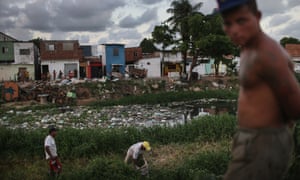Zika isn’t a global health threat like Ebola. It needs a targeted response

News reports from Brazil have understandably raised concerns about the increasing spread of the mosquito-borne Zika virus across the American continent and even into the US. Alarmingly, this disease has been linked to the rise in microcephaly cases among newborns (a foetal abnormality that limits the development of the brain in the womb), although there has been no conclusive evidence of this.
With the World Health Organisation executive board in full swing, and soon after the World Economic Forum’s designation of infectious disease as a key global challenge, Zika has received considerable global attention. Notably, there has been a growing conversation focused on learning lessons from the failures of the global health community during the Ebola outbreak in west Africa, and applying these to Zika to ensure that this virus doesn’t become the next big global health threat.
While this comparison may be understandable, it ignores two important points. First, the response to Ebola as a global security threat failed to produce a comprehensive mechanism to stop the outbreak. Second, Zika is a very different disease to Ebola and warrants a different policy response.
Ebola inspired fear in the public through violent symptoms, its rapid and uncontrollable spread, high case fatality and the lack of a viable cure. It was this fear that spurred western governments to install political placebos, such asairport screening, despite the flawed logic that this might stop the virus entering a country. While these security-focused policies may have played well with the electorate they did not actively improve the health situation in the affected states of Sierra Leone, Liberia and Guinea, and did nothing to improve sustainable health provision in these countries. Nor did most of these global decision-makers consider the impact that diverting their resources to one “threat” had on other local health concerns such as malaria and maternal health.
Quite simply, Zika does not pose the same security concern to the global population that we saw during Ebola and it should not be considered a threat in the same way. This is despite the US Centers for Disease Control now placing the virus at alert level two. Zika spreads through mosquito bites in affected regions, producing mild flu-like symptoms that rarely require hospitalisation and a negligible mortality rate. The virus can be readily controlled through effective mosquito control procedures, such as destroying the infected insects and larvae, or insecticide use.
I am not suggesting that we should ignore Zika or shouldn’t seek to protect unborn babies from potential harm. As a pregnant woman myself, I have the utmost sympathy for the affected women struggling with the impact of this disease on their children. However, we need to ensure the focus of the global community remains on sustainable measures to control mosquito borne infections, rather than knee-jerk security responses.
Zika is a disease of poverty, similar to other neglected tropical diseases such aschikungunya and dengue. The burden falls disproportionately upon poor populations living near open water sources which attract mosquitoes, and who do not have the resources to protect themselves individually though bite prevention methods.
We should be focusing on the positive health story this week that the UK government alongside the Bill and Melinda Gates Foundation have committed £3bn to fight malaria and other neglected diseases. Through understanding prevention and treatment mechanisms for mosquito-borne diseases, such as the development of genetically modified sterile mosquitoes, the global community will be much better prepared to respond to and prevent diseases such as Zika in the future.
As with other outbreaks, politics will decide if and how Zika will be controlled. But we should steer the conversation on to the positive steps of combating mosquito-borne diseases in a comprehensive manner, rather than turning Zika into a security issue, which may only result in mass panic and a potentially unsuitable global response.

No comments:
Post a Comment